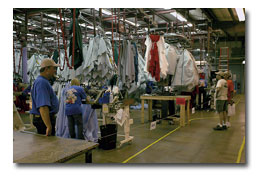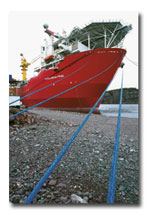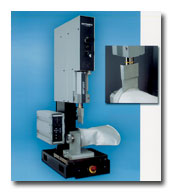Switzerland-based
SSM Schärer Schweiter Mettler AG has named
Alberto Negro
regional sales manager for Italy, the Balkans, India and Pakistan
.

Negro
At its recent International Conference & Exhibition, the
American Association of Textile Chemists and Colorists, Research Triangle Park,
N.C., presented the Olney Medal to
Rolf Georg Kuehni, North Carolina State University; the J.
William Weaver Award to
J. Richard Aspland, Clemson University, and
Pramod U. Shanbhag, Rockland Industries; the Henry E. Millson
Award for Invention to
David M. Lewis, University of Leeds, Perachem Ltd. and Innovink Ltd.,
and to
C. Douglas Weston; and the Harold C. Chapin Award to
Fred L. Cook, Georgia Institute of Technology.
Jones Apparel Group Inc., Bristol, Pa., has appointed
Lynne Cote
CEO, Wholesale Sportswear, Suits and Dresses. In addition, the company has announced the
following promotions
:
Gregg I. Marks , CEO, Jones Suit Divisions;
Mark Mendelson, chief merchandising officer, Better Apparel;
and
Susan Metzger
, president, sales and marketing, Better Sportswear.
Allen Questrom has been elected to the board.
Paxar Corp., White Plains, N.Y., has promoted
Susan P. Guerin
to president, North America Apparel Group; and
George Hoffman
to president, Apparel Business Development and Strategy, and Latin America Apparel
Group.
Seattle-based
Schoeller Textil USA Inc. has appointed
Gary Meikle
national sales manager
.

Meikle
The
Université de Haute, France, recently presented the Docteur Honoris Causa Award to
Bhuvenesh C. Goswami, Ph.D., alumni distinguished professor
of textiles at Clemson University
.
Clopay Plastic Products Co., Mason, Ohio, has appointed
Mary Jo Lilly, Ph.D.
, global business unit director.
Clariant International Ltd., Switzerland, has promoted
Patrick Jany
to chief financial officer.
The Dalton, Ga.-based
Carpet & Rug Institute (CRI) has appointed
Jim Bethel
, J&J Industries Inc., chairman, and
Robert Shaw
, Shaw Industries Inc., vice chairman, of the board. At its annual conference, CRI
presented
Paul Frierson
with the Joseph J. Smrekar Memorial Award.
Outlast Technologies Inc., Boulder, Colo., has named
Greg Roda
senior vice president, development, operations and business; and
Heather Listoe
marketing manager.
Tietex International Ltd., Spartanburg, has appointed
Kim Grimsley
vice president, design and merchandising.
SATO America Inc., Charlotte, has named
Terry Bresin
Western regional sales manager.
Polymer Group Inc., North Charleston, S.C., has named
Fernando Marin
senior director; and
Robert Best
director, sales and marketing, of its medical business unit.
N. Schlumberger SAS, France, and
Finlane S.p.A., Italy, have named
Patrick Strehle
director, product marketing; and
Andrea Certo
director, marketing and sales.
FKI Logistex®’s North American Manufacturing Systems unit, St. Louis, has
announced the following promotions:
Ken Thouvenot
, vice president, project management and engineering;
Matt Wicks
, director, systems engineering; and
Brett Felton
, international sales manager.
Morris Township, N.J.-based
Honeywell International has promoted
Jeremy Steinfink
to vice president and general manager, Honeywell Performance Products.
Shaw Industries Inc., Dalton, has named
Tracy Reid
builder design and merchandising manager, Builder Division.
Neuenhauser Inc., Greer, S.C., has named
Christine Templeton
senior accountant.
Designtex, New York City, has named
Rich Morrow
executive creative director.

Designtex
Enka tecnica GmbH, Germany, has named
Petra Ferreira
sales chief executive, North America.
Mohawk Industries Inc., Calhoun, Ga., has named
William C. “Chris” Wellborn
COO.
January/February 2006










